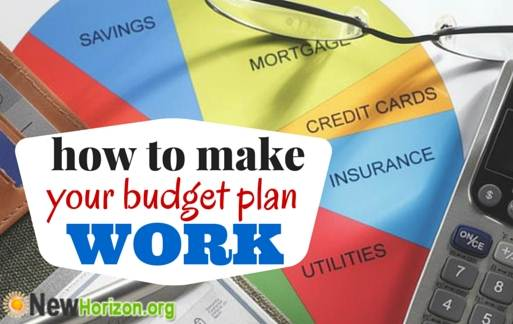How to Make Your Budget Plan Work
If you are experiencing debt problems, especially your credit card bills and loan accounts. There are things a good budget plan can do to help you pay off these debts and get back on track.
If you find that you are living paycheck to paycheck then, now’s the time to take the necessary steps to avoid having more serious financial and credit problems, later on. How? By employing the following suggestions that will help you build a solid budget plan that you can live with.
1. Your Budget Plan Starts By Evaluating Your Real Financial Status
Some people are not truly aware of their financial standing. Others are not even aware of their debts or how much they owe their creditors. In order to come up with an effective financial strategy, it’s very important to be aware of your personal standing.
Calculate how much you REALLY earn each month. This is your take-home pay. Do you have other income resources? If yes, how much do you earn from these? Write down your monthly earnings so you will know exactly how much money you have in your hands.
2. Set Realistic Budget Goals
When creating your budget plan, set realistic financial goals that you can achieve. Make sure your budget plan is sustainable, achievable, and realistic, so you don’t end up frustrated and discouraged.
3. Evaluate and track your expenses
A successful budget plan will require that you take a long hard look at how and where you are currently spending your money.
Make a list of all your expenses for the entire month. Be sure to include even the smallest costs. You may want to begin your list with monthly utility bills, followed by recurring expenses such as food and transportation costs, personal expenses, etc.
Start tracking your spending. For the next few weeks, you want to keep track of your spending. Whether you create a spreadsheet or use an app.
You will find that since you are more mindful of your spending, you will naturally reduce your impulse buying.
By monitoring your spending habits. This can help you identify where you might be overspending and where you can cut back.
4. Cut costs.
When you compare your monthly income and your expenses, it will be easy to see where to make adjustments or changes. How much do you spend on leisure activities? Look for items on your list that are not vital. What items can you cut from your list so you can free up money for savings or paying off high-interest debt?
For example, do you have magazine subscriptions? You may switch to online magazines which are usually free instead of receiving them from the mail. You don’t have to entirely give up everything. For example, you may consider switching to a lower cable plan or internet package to reduce the monthly fees.
After cutting unnecessary items, make a new list, and calculate the total cost. How much were you able to save by making some changes? Sometimes, seeing the results on paper makes things clearer than just calculating the costs in your head.
5. Make your savings count.
What will you do with the money you save from cutting costs or being more frugal? Make sure that your savings are not wasted. There are many ways you can put the money you are saving to work for you:
- Put that money towards paying off high-interest debt
- Put the money into a savings account or high-yield investment account
- Put it towards your “rainy day” savings account
6. Resolve not to break the plan.
It’s important to stick to your budget plan once you’ve created it. This means making conscious decisions about your spending habits and avoiding impulse purchases that can throw your budget off track.
Divide your expenses according to categories such as utilities, food budget, transportation allowance, leisure, debt repayment, savings, etc. Set a specific and reasonable amount that you can spend for each section on your list.
Make sure that the most important costs are at the top of your priority. Resolve to follow the plan even when it seems inconvenient. Your budget plan will only work if you are motivated enough to follow it not just for the next few months, but for the long term.
7. Create a contingency plan
Unexpected expenses can occur at any time, so it’s important to have a contingency plan in place. Create an emergency fund that you can tap into when you need to cover unexpected costs, such as car repairs, medical bills, or a sudden job loss.
8. Review your budget regularly
Review your budget plan regularly to make sure you’re on track and to adjust your budget as needed. Life circumstances can change, and your budget plan may need to be modified accordingly.
Regularly reviewing your budget can help you stay on top of your finances and achieve your financial goals.



